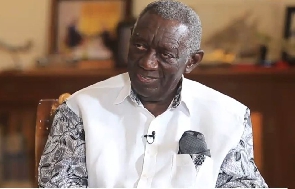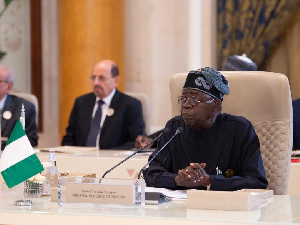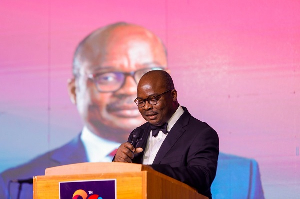Resetting the economy back to resilience will be a gradual process over the next two to three years, the First Deputy Governor of the Bank of Ghana (BoG), Dr Maxwell Opoku-Afari, has said.
He said it would require collective and collaborative support and burden-sharing to “build back better.”
Dr Opoku-Afari who was speaking at the 5th Chief Executive Officers Summit in Accra on Monday said the BoG was committed to ensuring that the banking and other non-bank financial institutions remained resilient, inclusive and support the resetting Ghana’s post-COVID economy back to stability and growth.
The programme was on the theme “Resetting Ghana’s Economy: Policy Response and Strategies for Building a Resilient Economy Post-COVID Pandemic.”
Dr. Opoku-Afari said that lessons drawn from other countries on “building back better” from the pandemic indicated that a flattened COVID-curve was a necessary condition prior to massive rollout of policies and strategies designed to reset the economy, stressing the “reason being that subsequent COVID flare-ups could potentially slow the recovery process.”
“Based on this, the short-term strategies to reset Ghana’s economy should be too, first sustain the flattened COVID-curve. By this, priority must be given to health sector policies and other supportive measures including testing, tracing and treatment, alongside mass vaccination rollouts should continue to achieve some form of herd immunity,” he said.
The First Deputy Governor observed that a flattened curve would keep the economy open for business, provide some certainty to the economic outlook, and prevent diversion of resources to any resurgence of the pandemic.
Dr. Opoku-Afari indicated that the second objective was to maintain the COVID-policy responses to sustain the ongoing V-shaped recovery.
“To a large extent, the COVID-policy responses (accommodative fiscal and monetary 7 policies, macro-prudential measures, and other initiatives) proved timely and helped moderate what could possibly have been the worst outcome for the Ghanaian economy,” he said, adding that “Already, the implementation of these policies has spurred some recovery evidenced by improvement in the Bank’s high-frequency economic indicators for the first quarter of 2021.”
The First Deputy Governor said the medium to long term strategies should include innovative and actionable macroeconomic policies to unwind the COVID-related fiscal excesses and lower the public debt to sustainable levels.
Dr. Opoku-Afari mentioned some of the strategies as domestic tax mobilisation through tax reforms, expenditure rationalisation programmes that were pro-growth and promote value-for-money projects, complementary monetary policy macro-prudential measures and effective implementation of pro-growth Ghana CARES programme.
The others are continued investments in the public health infrastructure over the medium term and digitisation to improve the business environment.
The First Deputy Governor stressed that before the coronavirus pandemic, the implementation of sound macroeconomic policies between 2017 and 2019, significantly improved the macro fundamentals of the Ghanaian economy.
“Broadly, the economy was characterised by strong Gross Domestic Growth, averaging seven per cent over the period, and inflation declined to single-digits and within the Bank’s medium-term target of 8±2 percent. Unwinding of the large macro imbalances resulted in lower fiscal and current account deficits, accompanied by three consecutive years of trade surpluses,” Dr. Opoku-Afari said.
But, the First Deputy Governor said the outbreak of the COVID-19 pandemic had shattered the positive outlook of the Ghanaian economy with elevated debt levels.
Dr. Opoku-Afari said it was good inflation had returned to single-digit and within the Bank’s medium-term target of eight plus or minus two per cent.
Business News of Friday, 21 May 2021
Source: ghanaiantimes.com.gh

















